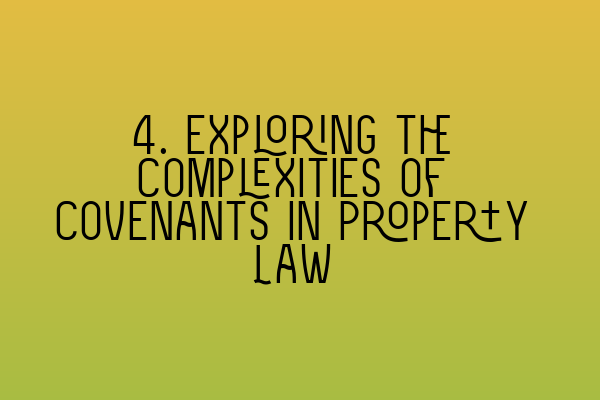
Greetings, esteemed readers! Welcome to the SQE Property Law & Land Law blog. Today, we delve into the fascinating world of property law to explore the complexities of covenants in property transactions. Covenants play a crucial role in defining and regulating the rights and obligations of property owners, and understanding their intricacies is essential for any aspiring solicitor or property law enthusiast.
What are Covenants in Property Law?
Before delving into the complexities, let’s start with the basics. A covenant, in the context of property law, refers to a legally binding agreement or promise made between parties in relation to the use, development, or restrictions of a property. These agreements are typically included in freehold or leasehold contracts and impose obligations on the parties involved.
There are various types of covenants, each serving a specific purpose and affecting the rights and obligations of the parties in different ways. Some common types include restrictive covenants, positive covenants, negative covenants, and reciprocal covenants.
The Complexities of Covenants
As with any legal concept, covenants come with their fair share of complexities and nuances. For instance, the enforceability of covenants can be a contentious issue. In some cases, covenants may be binding on successors in title, which means that even if the original parties who entered into the covenant are no longer the owners, the obligations still apply.
Enforceability of restrictive covenants: Restrictive covenants are commonly used to impose restrictions on the use or development of a property. However, their enforceability can be subject to various factors, such as the intention of the parties, reasonableness, and whether the covenant benefits the dominant land. The courts carefully consider these factors before deciding whether to enforce a restrictive covenant.
It is important to note that restrictive covenants can limit the potential use and development of a property, which can significantly impact its value. Therefore, it is crucial for property owners and prospective buyers to seek legal advice to understand the implications of any restrictive covenants when considering a property transaction.
Enforceability of positive covenants: Positive covenants, on the other hand, refer to obligations to do something, such as maintaining a wall or contributing to the upkeep of shared areas. Unlike restrictive covenants, positive covenants do not automatically bind successors in title, which means the obligations may not carry over to subsequent owners. However, there are exceptions to this rule, such as the rule of notice or express agreement to bind successors. These exceptions can create complexities and potential disputes.
Modification or discharge of covenants: In certain circumstances, it may be possible to modify or discharge a covenant. However, this can be a complex process that requires adherence to specific legal requirements and obtaining the consent of the affected parties or a court order. The rules governing the modification or discharge of covenants can vary, and it is important to consult with a solicitor who specializes in property law to navigate through these complexities.
Professional Guidance for Covenants in Property Law
Given the complexities of covenants in property law, it is imperative to seek professional guidance to ensure compliance with legal obligations and protect your interests. At SQE Property Law & Land Law, our team of experienced solicitors is well-versed in all aspects of property law, including covenants.
Whether you are a property owner seeking to enforce or modify a covenant, a buyer evaluating the impact of covenants on a prospective property, or a solicitor navigating through a covenant dispute, our expertise can help you achieve the best possible outcomes.
If you’re preparing for the SQE 1 or SQE 2 exams, understanding property law, including covenants, is essential. Our SQE 1 and SQE 2 preparation courses are designed to provide comprehensive coverage of the syllabus, including in-depth discussions on covenants and other key concepts. Our practice exam questions and practice mocks can also help you assess your knowledge and maximize your chances of success!
So, whether you’re a property law enthusiast or a budding solicitor, dive into the complexities of covenants with us and expand your understanding of property law. Feel free to explore our related articles on SQE 1 Practice Exam Questions, SQE 1 Practice Mocks FLK1 FLK2, SQE 2 Preparation Courses, SQE 1 Preparation Courses, and SRA SQE Exam Dates for further insights and information.
Thank you for joining us on this illuminating journey through the complexities of covenants in property law. Stay tuned for more exciting content from SQE Property Law & Land Law!
